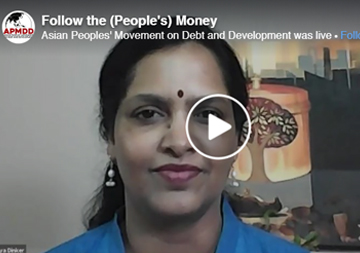WEBINAR: FOLLOW THE (Peoples') MONEY - How the Governments of the world's biggest economies are spending Public Funds in response to the Multiple Crisis: COVID19, Economic Crisis, Climate Crisis
AEPF joined Asia People’s Movement on Debt and Development (APMDD), Fight Inequality Alliance Asia and ActionAid to co-host an online event titled “FOLLOW THE (Peoples’) MONEY: How the Governments of the world’s biggest economies are spending Public Funds in response to the Multiple Crisis: COVID19, Economic Crisis, Climate Crisis”
The webinar was held Live on 17 July 2020, and is available to view on the AEPF website and on Facebook.
Speakers of this webinar included a number of researchers and activists from both Asian and European countries.
Lidy Nacpil is a member of AEPF’s Climate Justice cluster, cofounder of the Fight Inequality Alliance, and coordinator of Asian Peoples’ Movement on Debt and Development. She is also co-coordinator of the Global Campaign to Demand Climate Justice, serves on the coordinating committee of the Financial Transparency Coalition, and is Vice President of the Freedom from Debt Coalition based in the Philippines. Lidy began by offering a general overview of these multiple and overlapping crises, and the role that our governments, financial institutions and corporations are playing to largely exacerbate these crises.
Tim Jones was the second speaker on the panel. Tim is head of policy at the Jubilee Debt Campaign UK, a UK based organization that campaigns for cancellation of unjust debts in solidarity with campaigners in the global South and for households affected by debt in the UK. Tim spoke about discussed the Fiscal Response Measures to the COVID19 crisis taken by governments in the UK, US, Japan, Germany and elsewhere, as well as the current role of international financial institutions including the IMF and WB.
The next speaker was Iolanda Fresnillo, senior policy and advocacy officer at Eurodad – the European Network on Debt and Development, which works for debt justice. She is also active in the Spanish Citizens Debt Audit Platform and other local and international social movements. Iolanda worked for over a decade as a researcher at Debt Observatory in Barcelona and as a research consultant at MSF France International Institute, as well as several local authorities in Catalonia and Spain. She discussed the Debt Service Suspension Initiative of the UN.
Claire Miranda is senior policy and program officers of the Asian Peoples’ Movement on Debt and Development. She’s worked with the secretariat at APMDD for 11 years under several campaigns and programs. She’s currently leading APMDD’s work on the Green Climate Fund, monitoring both meetings and decisions, providing relevant updates and analysis. Claire spoke about the G20 government’s commitments and the failure to deliver climate finance given the climate crisis.
Alex Doukas is the Stop Funding Fossil Fuels Program Director at Oil Change International. His work focuses on ending international subsidies and public finance for fossil fuels and shifting public resources towards building a clean energy future, including funds for access to energy. Alex spoke about the continued public subsidies for fossil fuels into the year 2020, at a time when GHGs are supposed to be peaking globally.
The webinar and lively Q&A sessions were moderated by Vidya Dinker of INSAF and Kris Vanslambrouck, member of AEPF CJ cluster and 11.11.11.
This event was designed for researchers and advocates to share knowledge and concerns with a wider audience regarding how public funds are being used in response to the COVID19, economic and climate crises. The webinar was strategically held the day before the July 18 and 19 G20 preparatory ministerial meetings of the Finance Ministers and Central Bank Governor in the lead up to the G20 Leaders Summit scheduled in Saudi Arabia in November this year.
As governments of the world’s biggest economies, their policies and actions – individually and as the G20 – have huge impacts globally. As we brace ourselves for the further worsening of the COVID19 pandemic, the deep economic crisis it has spawned, and climatic changes that threaten the entire planet — we are spotlighting how these governments are responding across these multiple crises, in particular their use of public funds.
This webinar looks at and compares the following:
- G20 Governments’ Spending for COVID19 fiscal response measures – for whose relief and recovery?
- G20’s Debt Service Suspension Initiative – Savings for COVID19 or Delayed but Bigger Burden?
- G20 Governments’ Commitments and Delivery of Climate Finance – Where is the Finance?
- G20 Government Subsidies for Fossil Fuels – This is what they Finance!
The 90-minute webinar provides information, analysis and perspectives on the general landscape on these issues and is the kick off to a series that will delve deeper in specific topics in the coming weeks.
Also read:
The G20 continues to ignore calls to cancel the debts of the world’s poorest countries and stop funding fossil fuels
(Dorothy Grace Guerrero on Global Justice Now)



